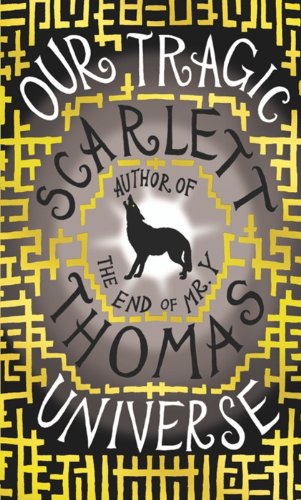[Chekhov] wasn't bothered about the meaning of life in general, but life as it is lived, He was more interested in what people around him said and did. He was obsessed with the detail of life. Tolstoy always saw his own writing as "teaching" and had his breakdown partly because he was so anxious that he didn't have anything to teach. But Chekhov only ever saw his own writing as the formulation of questions, and so didn't need to have a crisis about it.While I first found the meandering plot, or lack of plot, distracting, at some point I was drawn into the bleak and hopeful world without noticing. It was one of my favorite reads this year.
Saturday, December 18, 2010
Our Tragic Universe
After finishing this novel, I was left with that empty feeling one feels after immersing oneself unintentionally into another world. Our Tragic Universe is at once complicated and uncomfortably familiar. The characters are well-rounded, with both likeable and eye-rolling qualities in spades, and their relationships with one another reflect all the intricacies and redundancies and paradoxes we experience in our own lives. The book explores many different concepts, our relationship with stories and fiction, the structure and lack of structure in meaningful stories, paradoxes and 'storyless stories' or metafiction. This novel is all of those and none of those at once. Thomas often discusses Tolstoy and Chekhov, admiring both, and their differences:
Monday, December 6, 2010
David Loses Against Goliath
These are now our only options if we want to fly in the good old USA:
 or
or 
All in the name of our security? Apparently neither of these methods would have caught the infamous underwear bomber, the touted reason behind these 'enhanced' security measures. Our fearless leader Obama appears to support these infringements of our constitutionals rights. So far, a breast cancer survivor has been forced to remove a prosthetic breast, a sexual assault survivor's sanitary napkin showed up in the body scan and she was subjected to a traumatizing molestosearch anyway, a bladder cancer survivor who has to wear a urostomy bag was left covered in his own urine after an aggressive search, and a woman who refused the scanners and asked questions about the pat down procedure had her ticket ripped up and was then handcuffed and escorted out of the airport.
All modesty aside, it's not clear what health effects these scanners might have. The TSA continually claims that the radiation that one is exposed to in a scanner is equivalent to 2 minutes of flight time. However, the radiation from the scanner is concentrated on the skin. Does this expose us to greater risk of skin cancer? No study seems to eliminate that possibility, as most seem to be based on general radiation exposure.
Neither of these methods would detect a device shoved up someone's... body cavity. But the TSA, so far, will not do random body cavity searches. (But is that next?) It's not even clear that either of these new invasive procedures would have caught the infamous underwear bomber. But you know what would have prevented him from boarding the plane? Israeli security methods, based on behavioral profiling. According to an article in the Toronto Star, everyone has to pass through 6 layers of security, in which highly trained security agents look at the actual passengers for any signs of nervousness or distress. Moreover, passengers go through these 6 levels of security in 30-40 minutes (apparently):
Oh, and I almost forgot: these invasive procedures are a clear violation of our constitutional rights. Illegal search and seizure, anyone? I don't recall the mere desire to fly on a plane as constituting probable cause for a strip search.
So are we going to lie down and take it? Allow naked, possibly cancer-causing pictures to be taken of us? Or let ill-trained TSA agents (who would rather not molest us, let's hope) to invasively search us?
After the non-wave-causing opt-out day and the dying down of the media coverage of the issue, I'd guess... yup. And I'll be taking the train.
 or
or 
All in the name of our security? Apparently neither of these methods would have caught the infamous underwear bomber, the touted reason behind these 'enhanced' security measures. Our fearless leader Obama appears to support these infringements of our constitutionals rights. So far, a breast cancer survivor has been forced to remove a prosthetic breast, a sexual assault survivor's sanitary napkin showed up in the body scan and she was subjected to a traumatizing molestosearch anyway, a bladder cancer survivor who has to wear a urostomy bag was left covered in his own urine after an aggressive search, and a woman who refused the scanners and asked questions about the pat down procedure had her ticket ripped up and was then handcuffed and escorted out of the airport.
All modesty aside, it's not clear what health effects these scanners might have. The TSA continually claims that the radiation that one is exposed to in a scanner is equivalent to 2 minutes of flight time. However, the radiation from the scanner is concentrated on the skin. Does this expose us to greater risk of skin cancer? No study seems to eliminate that possibility, as most seem to be based on general radiation exposure.
Neither of these methods would detect a device shoved up someone's... body cavity. But the TSA, so far, will not do random body cavity searches. (But is that next?) It's not even clear that either of these new invasive procedures would have caught the infamous underwear bomber. But you know what would have prevented him from boarding the plane? Israeli security methods, based on behavioral profiling. According to an article in the Toronto Star, everyone has to pass through 6 layers of security, in which highly trained security agents look at the actual passengers for any signs of nervousness or distress. Moreover, passengers go through these 6 levels of security in 30-40 minutes (apparently):
"First, it's fast — there's almost no line. That's because they're not looking for liquids, they're not looking at your shoes. They're not looking for everything they look for in North America. They just look at you," said Sela. "Even today with the heightened security in North America, they will check your items to death. But they will never look at you, at how you behave. They will never look into your eyes ... and that's how you figure out the bad guys from the good guys."Look at the person? Analyze their behavior? How novel. The article also claims that unlike us passive lie-down-and-take-it Americans, Israelis won't stand for ridiculously invasive or time-consuming security procedures, especially if they aren't likely to catch terrorists.
"Israelis, unlike Canadians and Americans, don't take s--- from anybody. When the security agency in Israel (the ISA) started to tighten security and we had to wait in line for — not for hours — but 30 or 40 minutes, all hell broke loose here. We said, 'We're not going to do this. You're going to find a way that will take care of security without touching the efficiency of the airport."The article goes into more problems with American security, such as herding large numbers of people into a small area that resembles a mob scene (but you can tell it's not because of all those line dividers keeping the would-be passengers in place), which before you pass through any security is an easy target for someone wanting to take out a large number of people (say, the number that might board a plane).
Oh, and I almost forgot: these invasive procedures are a clear violation of our constitutional rights. Illegal search and seizure, anyone? I don't recall the mere desire to fly on a plane as constituting probable cause for a strip search.
So are we going to lie down and take it? Allow naked, possibly cancer-causing pictures to be taken of us? Or let ill-trained TSA agents (who would rather not molest us, let's hope) to invasively search us?
After the non-wave-causing opt-out day and the dying down of the media coverage of the issue, I'd guess... yup. And I'll be taking the train.
Subscribe to:
Posts (Atom)
